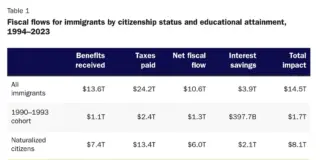By Tom Perkins,
Thinktank report says ‘resounding evidence’ shows companies continue to keep prices high even as their inflationary costs drop
A new report claims “resounding evidence” shows that high corporate profits are a main driver of ongoing inflation, and companies continue to keep prices high even as their inflationary costs drop.
The report, compiled by the progressive Groundwork Collaborative thinktank, found corporate profits accounted for about 53% of inflation during last year’s second and third quarters. Profits drove just 11% of price growth in the 40 years prior to the pandemic, according to the report.
Prices for consumers rose by 3.4% over the past year, but input costs for producers increased by just 1%, according to the authors’ calculations, which were based on data from the Bureau of Economic Analysis and National Income and Products Accounts.
“Costs have come down substantially, and while corporations were quick to pass on their increased costs to consumers, they are surprisingly less quick to pass on their savings to consumers,” Liz Pancotti, a Groundwork strategic adviser and paper co-author, said.
Since pandemic inflation spiked in 2021, a high-stakes debate has played out about its sources. Many progressive economists pointed to corporate profits – or “greedflation” – and supply chain issues as a driver of high prices, while their more conservative counterparts singled out government stimulus cash and high wages.
The report’s authors scoured corporate earnings calls and found executives bragging to shareholders about keeping prices high and widening profit margins as input costs come down.
The findings come as the Federal Reserve has hiked interest rates to their highest point in 20 years. The report casts serious doubt on the need for further interest rate hikes, and instead calls for stronger policies to rein in “corporate profiteering”.
Prices rose in 2021 as labor costs jumped and supply chain shocks from the pandemic and the Ukraine war snarled shipping traffic and left energy supplies in question. But those issues have in many cases been fully sorted out or are easing, and the labor market has stabilized. Many commodities and services producers’ prices have actually decreased, the report notes.
Nearly 60% of the drop in key goods and services’ inputs was driven by large declines in energy costs, such as jet fuel and diesel fuel, while transportation and warehousing costs have fallen by nearly 4% since June 2022 peaks.
Still, prices remain high. Consumers are still paying about 25% more for groceries, the report notes as an example.
Corporations maintain high prices by exploiting cost shocks caused by events such as the Ukraine war and coordinating price hikes, said Isabella Weber, a University of Massachusetts Amherst economist who was not part of the paper.
The shocks create an environment in which it is safe for firms to increase prices as they expect their competitors to do the same, said Weber.
“This is a form of implicit collusion,” she said. “Firms do not even need to talk to one another to know that a cost shock is a great time to raise prices. But when costs fall, price-setting firms do not have any incentive to decrease prices.”
If no firms launch a price war, Weber added, then companies “hold the line” on prices and widen margins. She pointed to food processors as an example.
The paper zooms in on the diaper industry, of which Procter & Gamble and Kimberly-Clark control 70% of the domestic market. Diaper prices have increased by more than 30% since 2019 from, on average, $16.50 to nearly $22.
The rise was partly driven by an increase in commodities like wood pulp, a major component of diapers. Wholesale wood pulp prices soared by 87% between January 2021 and January 2023, but last year prices dropped by 25%.
Still, diaper prices have not come down with lower costs, the authors say. Groundwork examined earnings calls and found executives at both companies boasting of widening profit margins as input costs decreased. A drop in inputs accounted for about one-third of Kimberly Clark’s profits, company executives said.
P&G executives said in their July earnings call they expect $800m in windfall profits because of declining input costs, suggesting they won’t bring down prices.

Meanwhile, workers aren’t faring as well – corporate profits as a share of national income are up by about 29%, and workers’ share of corporate earnings is still down from pre-pandemic levels.
The Biden administration has taken steps to strengthen supply chains, Pancotti noted, and Joe Biden recently called on corporations to stop “gouging” consumers as input costs fall. But Pancotti and Weber called for stronger action, pointing to other nations with forms of price control in place.
In France, the government intervenes in price negotiations among retailers and producers. Earlier this month, with the government’s support, the supermarket chain Carrefour banned some PepsiCo products from its shelves because of “unacceptable price increases”.
Absent strong government intervention in pricing, the 2025 expiration of the Trump corporate tax cuts presents an opportunity to rein in corporations via the tax code, Pancotti said.
“We’ve decided as a country that we like to have very large, powerful corporations and we are OK with them being very profitable,” she said. “We need to take a really hard look at how our tax code incentivizes corporate profiteering and ask: ‘Do we as a country want to do something about that?’”
Source: https://www.theguardian.com
Disclaimer: We at Prepare for Change (PFC) bring you information that is not offered by the mainstream news, and therefore may seem controversial. The opinions, views, statements, and/or information we present are not necessarily promoted, endorsed, espoused, or agreed to by Prepare for Change, its leadership Council, members, those who work with PFC, or those who read its content. However, they are hopefully provocative. Please use discernment! Use logical thinking, your own intuition and your own connection with Source, Spirit and Natural Laws to help you determine what is true and what is not. By sharing information and seeding dialogue, it is our goal to raise consciousness and awareness of higher truths to free us from enslavement of the matrix in this material realm.
 EN
EN FR
FR

























